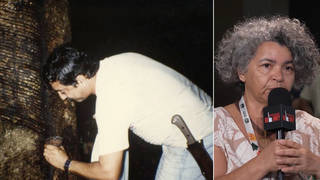
Guests
- Ben Emmersona U.N. special rapporteur on human rights and counterterrorism, who has issued an interim report on his investigation into U.S. drone strikes and targeted killings.
Ben Emmerson, the United Nations special rapporteur on human rights and counterterrorism, has called on Britain and the United States to release confidential reports into the countries’ involvement in kidnapping and torture of terrorism suspects during the era of the George W. Bush administration — after years of denial. “A crucial part of the duty of accountability under international law is the so-called right to truth,” Emmerson says. “That’s a right that is not just belonging to the victims, but to society at large.”
Transcript
AMY GOODMAN: Ben Emmerson, finally, you’ve called on Britain and the U.S. to release confidential reports into the countries’ involvement in the kidnapping and torture of terrorism suspects, accusing them of years of official denials. Can you expand on that?
BEN EMMERSON: Yes, I presented in my last report to the Human Rights Council a series of principles on accountability for what are described in international law as gross or systemic human rights violations. And I think that there’s no doubt that the conspiracy that involved the commission of acts of secret detention, torture and rendition under the Bush administration constitute gross and systematic human rights violations. And international law is clear on this. There is no superior orders defense. There is no principle that would justify—just as at the Nuremberg trials there was no principle that would allow someone to say, “Well, this is what was ordered by my officials.” There must be—international law requires that there be—a system for achieving accountability.
And we know that the Feinstein Senate committee report into the activities of the CIA is said to be a very thorough and comprehensive analysis and to identify who made the decisions, who committed the acts alleged, and where and how and why. And a crucial part of the duty of accountability under international law is the so-called right to truth. And that’s a right that’s not just belonging to the victims, but to society at large. And, therefore, I mean, the time has come, unequivocally, for the release of the Feinstein report. I mean, if there have to be particular redactions in order to protect the identity of operatives from reprisals, so be it. But the key findings of the Feinstein report and of a parallel report commissioned and prepared and provided to the British prime minister in relation to the United Kingdom’s involvement in these activities must now be made public. And we will not stop calling for the publication of this material until at least a sufficient amount of it has been put into the public domain.
AMY GOODMAN: Ben Emmerson, I want to thank you for being with us, U.N. special rapporteur on human rights and counterterrorism, has issued an interim report on his investigation into U.S. drone strikes and targeted killings. His findings, along with a report by the U.N. special rapporteur on extrajudicial executions, will be debated today at the U.N. General Assembly. This is Democracy Now!, democracynow.org, The War and Peace Report. When we come back, a drone operator. Stay with us.












Media Options